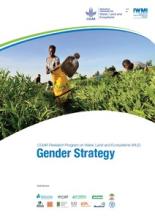Land Library Search
Through our robust search engine, you can search for any item of the over 73,000 highly curated resources in the Land Library.
If you would like to find an overview of what is possible, feel free to peruse the Search Guide.
/ library resources
Showing items 1 through 9 of 194.This publication is a practical guide to the Youth and Land Responsiveness Criteria, which is a tool that can be used to increase the incorporation of youth perspectives into land matters at both institutional and programme levels, through a participatory process.
This report summarizes a case study of the Mexican ejidocommunity tenure system. Mexico was selected for this case study because of the rich history and extensive scale of the country’s community land tenure and registration systems.
Since 2009, the Government of Switzerland and RECOFTC have partnered with ASEAN through the Swiss Agency for Development and Cooperation (SDC)’s support to the ASEAN Social Forestry Network (ASFN) and the ASEAN-Swiss Partnership on Social Forestry and Climate Change (ASFCC).
Despite the popularity and the unique nature of women's self-help groups in India, evidence on the economic impact of these groups is scant.
WLE’s Gender Strategy sets out a path for the program to engage in pioneering research that generates findings and catalyzes action to address the gender-based challenges facing women and men, who are dependent on water, land and ecosystems for their livelihoods, food, nutrition and water securit
The Kingdom of Saudi Arabia and FAO have a significant history of cooperation.
This report explores how the management of land-based biomass production and consumption can be developed towards a higher degree of sustainability across different scales: from the sustainable management of soils on the field to the sustainable management of global land use as a whole.
Over the last few years research funding has increasingly moved in favour of large, multipartner, interdisciplinary and multi-site research projects.
Over the last few years research funding has increasingly moved in favour of large, multipartner, interdisciplinary and multi-site research projects.







